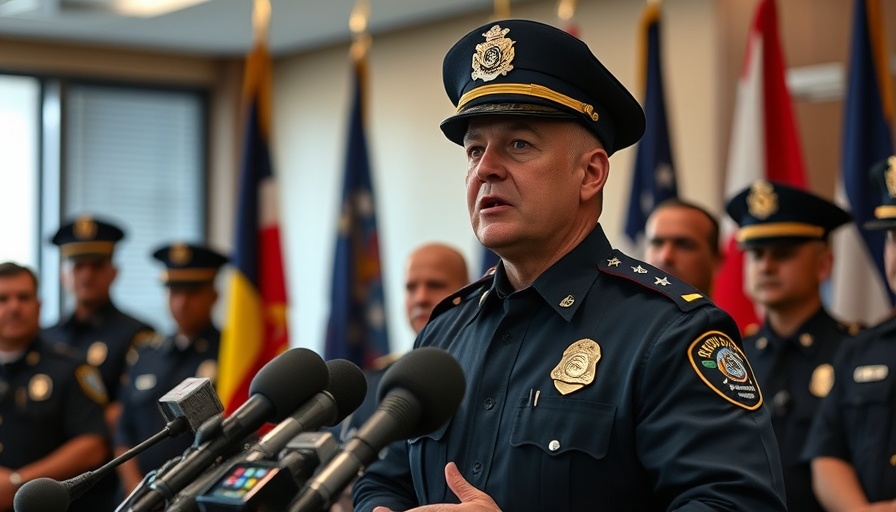
Confronting the Dark Reality of Human Trafficking in Florida
In a significant operation led by the Polk County Sheriff's Office, a staggering 244 individuals were arrested in just nine days as part of an undercover initiative targeting human trafficking. This initiative shed light on a disturbing truth: human trafficking is not just a distant problem; it exists in our communities, affecting people from all walks of life. The diversity among those arrested, from medical professionals to former athletes, highlights the delusion that this issue is limited to certain socioeconomic classes.
In 'Hundreds arrested in Florida human trafficking operation', the discussion delves into the alarming reality of human trafficking, prompting us to explore its deeper implications and necessary actions.
Behind the Headlines: Who Are These Suspects?
Among the arrested were individuals like 34-year-old Adarius Taylor, a former linebacker for the Tampa Bay Buccaneers, and a mother, Sherry Pena, who was accused of driving her daughter to the operation under the pretense of buying drugs. These cases raise critical questions about the psychological and social factors leading individuals into the world of human trafficking. As Sheriff Grady Judd noted, many participants in these operations bring their families into such situations, leaving us to ponder their thought processes.
The Role of Law Enforcement and Community Engagement
The operation was a collaborative effort between local law enforcement and federal agencies such as ICE, showcasing a growing willingness to tackle this pressing issue. Sheriff Judd emphasized that the presence of human trafficking can no longer be dismissed with statements like, 'We don’t have that problem here.' Instead, the community needs to recognize that trafficking can occur anywhere.
Legislative Push: From Misdemeanor to Felony
Amid this operation, there is a call for legislative action aimed at reducing the demand for trafficking. Advocates from social services organizations like 'One More Child' are urging lawmakers to enhance penalties for first-time solicitors of prostitution from a misdemeanor to a felony. By strengthening the legal framework, the hope is to deter potential buyers and tackle the root of the problem.
Understanding the Victims: The Hidden Trauma
The operation not only highlighted the number of predators but also uncovered potential victims. Law enforcement identified four individuals whom they suspect may be victims of human trafficking. This underscores the complexity of the issue, where the victims themselves often get lost in the narrative. Understanding their plight is crucial in formulating effective solutions.
Florida's Broader Context: Are We Doing Enough?
The scale of this operation in Polk County should alarm residents across Florida. It's easy to assume that human trafficking occurs in faraway places, and that Florida, with its sun-soaked beaches and thriving tourism, is insulated from such horrors. However, the truth is that every community is susceptible. Awareness and proactive measures are essential to combat this pervasive crime.
The Emotional Toll and Community Impact
Behind the stark statistics are the emotional traumas experienced by victims and their families. Communities must grapple with the fallout of such criminal activities, including a potential decrease in local trust and safety. The psychological ramifications extend beyond the victims, affecting families and communities at large, which can foster a climate of fear and uncertainty.
Frequently Asked Questions About Human Trafficking
What is human trafficking?
Human trafficking involves the exploitation of individuals through force, fraud, or coercion for various forms of labor or commercial sex.
How can I report suspected trafficking activities?
If you suspect someone is a victim of human trafficking, contact local law enforcement or organizations dedicated to human rights and support.
What resources are available for victims?
Numerous social service organizations offer support, housing, and legal assistance for trafficking victims. Awareness and education are crucial in connecting victims with these services.
A Call to Action: What You Can Do
As the Polk County operation has demonstrated, the presence of trafficking is real and requires collective action. Community members must advocate for more proactive measures and support local initiatives aimed at educating the public and aiding victims. Engage with local non-profit organizations, attend community meetings, or participate in campaigns that work towards ending human trafficking. Remember, awareness is the first step towards change.
 Add Row
Add Row  Add
Add 






Write A Comment